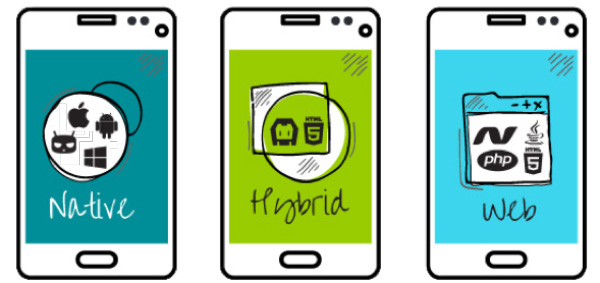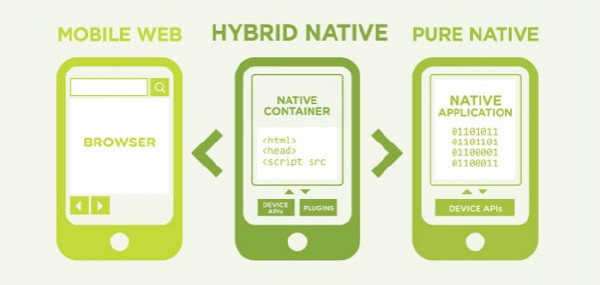The moment you choose to come up with an app, you are faced with several critical decisions; design, platform, marketing, business, and branding – all these aspects hold an absolute importance and impact towards the success of your mobile app. They also possess consequences in case you take the wrong decision. The most valuable ones in mobile app development are undoubtedly the technical ones. Changing your decision about the mobile app platform or technology late in the development process may waste hundreds of hours of efforts and ultimately raise the overall costs. But if you research and take the right decision, you will be able to come up with the amazing mobile app in the specified time frame.

What to Consider while Developing an App?
A successful mobile app development demands a clear purpose and in-depth research. By combining your app model with its main purpose, you will be able to focus on your audience’s requirements, and assure that the features and capabilities of your upcoming app are user-driven. Before taking any decision, you also need to ask yourself the following questions:
- What is your budget?
- What are you wondering to achieve with the app?
- How fast do you want your mobile app to be developed?
- What will you choose; in-house or outsourced development?
Apart from several significant technical decisions, you also need to choose between native, hybrid, or web app type. So, here is the guide that will help you choose your mobile app type and take the right decision while fulfilling your business, marketing goals, resources, and vision.
- Native apps
The easiest definition for native applications is that they are designed and developed for specific devices while using a platform-specific programming language. Means, an app which is specially built for iOS can’t work on Android devices or vice versa.
Let’s have a look at some essential features of native apps:
- Access to native API: Whether it’s iOS or Android; native applications can fully access the feature and API of the device.
- Technology: iOS applications are built in Objective C or Swift. On the contrary, Android applications are developed in Java.
- Distribution process: Through App Stores.
- Multi-platform capability: Of course, none – native apps are limited to the platform it’s specially developed for.
Though, native applications can get full advantage of the device features and capabilities, such as camera, GPS, contact list, etc. They run directly from the platform (iOS, Android, Windows) they are developed and provide a true native experience.
Advantages
- They provide a fast, reliable, and fully-responsive experience.
- They are known for utilizing the least amount of hardware because of dynamic coding.
- They can access native device feature to enhance the experience.
- They use push notifications to improve the usability of an app and promote specific paths and goals in the app.
Nevertheless, there are some downsides of native apps that must be considered:
Disadvantages
- They can only reach a particular range of audience with a single platform and dismiss the other one.
- Developing a mobile app for two platforms is extremely costly and demands an enormous amount of time & efforts.
- It’s hard to maintain and update the app on multiple platforms with the different codebase.
- It is challenging for the developers to give the same experience with different applications on different platforms.
- Most of the developers have expertise in one platform, so you will have to hire two developers or teams to develop and maintain two dedicated apps.
- Web apps
Web apps are usually websites that seem like a mobile app because of their high functionality and interactivity. They are served via the internet and run in browsers. They can also be downloaded to a mobile device like native apps.
Let’s have a look at some essential features of web apps:
- Technology: Coded in CSS, HTML, and JavaScript.
- Access to native API: No – they run via the browser. Besides, they don’t have access to functionalities of your device.
- Distribution Process: Through the web (hosting).
- Multi-platform capability: Same code base is distributed across multiple platforms.
- You don’t need to write separate code bases for different platforms.
- There is no approval process to restrict the launch.
Advantages
- The web app development is much easier and quicker.
- It is relatively affordable to come up with a web application.
- It is easy to develop, deploy, and manage them as they don’t demand an update in an app store.
- You don’t need to write separate code bases for different platforms.
- There is no approval process to restrict the launch.
Disadvantages
- Inaccessible via app stores.
- They can’t access the native capabilities of your device.
- Less instinctive and interactive (slow operating speed)
- You can’t use them without an internet connection.
- They may not run flawlessly on some old devices and browsers.
- They run only in the browsers, making it difficult to create a user base.
- Hybrid apps
A hybrid application is one that adapts elements of both native and web applications. Hybrid mobile apps are developed in the same manner as the websites. Both utilize a combination of technologies like CSS, HTML, and JavaScript in order to target a WebView hosted inside a native container. They provide a feeling of a native app while allowing an application to be worked flawlessly on both iOS and Google Play Store.
Let’s have a look at some essential features of hybrid apps:
- Technology: Developed with a combination of HTML, CSS, and JavaScript.
- Distribution Process: Through app stores.
- Access to native API: Yes, it connects the native SDK and web view in which the mobile application runs.
- Multi-platform capability: Yes, the code base can be distributed over multiple platforms.
Hybrid apps access the full device capabilities such as the camera, contacts, accelerometer, and more.
Advantages
- It is relatively easy to build hybrid apps as most development is done using standard web technologies i.e. CSS, HTML, and JavaScript.
- They can avail the capabilities of device’s native features.
- Creating a single code base demands less time and efforts while saving the resources.
- It is easy to develop, deploy and manage the hybrid apps.
Disadvantages
- Some hybrid apps may lag compared to native apps. It depends on the quality of webview (user’s device capabilities) that commands the JavaScript code and represents the UI. Though the devices are getting better & faster; the performance gap is considerably reduced.
- It is a bit challenging to achieve some native experiences as the app is simultaneously developed for two different platforms.

How to choose the right one?
Now, you must have a clear picture of which app type will suit the needs of your app. You need to take following things in the account while planning an app:
- Development time
- Target audience
- User experience
- App features
- Available budget
- Available resources
- Discoverability
You can choose any option according to your budget, time, resourcing, goals, and business needs. If you are looking forward to come up with an amazing app without hiring a mobile app developer, then it is always recommended to choose a DIY app maker or builder.
App Builder
When planning to launch an app, we look for the solutions that are cost-effective and allow us to come up with a professional-designed mobile app. But, have you ever tried to develop an app on your own? DIY app builder is an online tool which allows you to build the amazing app without having any coding skills. It comes with pre-made templates, social media integration, location-based services, push notifications, mobile commerce capabilities, and other customization options. Means, you can easily create a fully-functional app for Android devices, and iPhones. All you need to do is to choose a suitable plan.
All these above-mentioned app types carry their own advantages and drawbacks, and the decision you make will affect the course of your growth. That’ why, it is necessary to understand your assets and limitations and use them to get the best outcome in the form of an app.
Author Bio
Nabeena Mali loves riding fixed gear bikes and does digital marketing, in that order. She drives digital growth at AppInstitute, a DIY app builder platform for small businesses and blogs about mobile trends and actionable digital strategies.
 CoalesceIdeas Web and graphic design ideas for inspiration
CoalesceIdeas Web and graphic design ideas for inspiration




